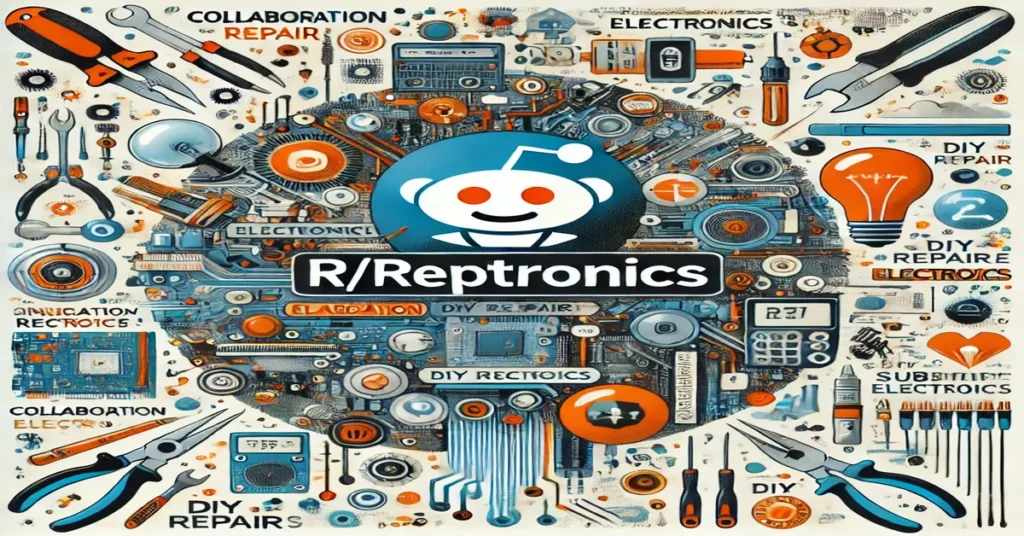In the ever-evolving landscape of technology, the rise of specialized online communities has revolutionized how enthusiasts, hobbyists, and professionals alike exchange knowledge, collaborate, and innovate. Among these unique digital communities is r/reptronics, a rapidly growing subreddit that has become a hub for those passionate about electronics and the diverse world it encompasses.
What is r/reptronics?
r/reptronics is a subreddit dedicated to discussions, projects, and insights into the world of electronics, with a strong focus on DIY (do-it-yourself) repairs, modifications, and electronic fabrication. Established as a niche platform for sharing expertise, troubleshooting advice, and showcasing personal projects, r/reptronics has attracted a vibrant community ranging from novice tinkerers to seasoned engineers.
The term “reptronics” itself is derived from a blend of “repair” and “electronics,” reflecting the community’s dedication to exploring how electronics can be revived, repurposed, and even enhanced. Whether you’re working on restoring vintage hardware, building custom circuits, or delving into microcontroller programming, r/reptronics offers a collaborative space where insights and innovative ideas flow freely.
The Core Focus Areas of r/reptronics
1. DIY Repairs
One of the foundational pillars of r/reptronics is its focus on electronic repair. Members frequently share their experiences in diagnosing issues and repairing various types of devices, from simple household gadgets to complex industrial machinery. The subreddit serves as an invaluable resource for those attempting to salvage or restore items that might otherwise be discarded.
Popular Topics in DIY Repairs
- Smartphone and tablet repair: Common threads include tips on replacing cracked screens, repairing charging ports, and diagnosing motherboard issues.
- Computer and laptop refurbishment: This includes CPU replacements, GPU repairs, and troubleshooting power supply issues.
- Vintage electronics restoration: A favorite among retro-tech enthusiasts, posts often showcase the rejuvenation of old radios, cassette players, and early computer models.
2. Custom Modifications
For users looking to go beyond simple repairs, r/reptronics is a playground for customization and modification. Members showcase projects where they’ve enhanced existing electronics or repurposed components to create something entirely new.
Examples of Custom Mods
- Adding features to old devices: Extending the functionality of an outdated device by integrating modern technology, such as Bluetooth adapters or Wi-Fi modules.
- LED modifications: Creative lighting projects that incorporate LED strips or custom-configured lighting arrays.
- Re-imagined controllers and peripherals: Modifying game controllers for ergonomic improvements or aesthetic customization.
3. Electronic Fabrication and Prototyping
Another significant aspect of r/reptronics is its dedication to the art and science of electronic fabrication. This often includes designing and assembling circuit boards, developing prototypes for new inventions, and experimenting with microcontrollers like Arduino and Raspberry Pi.
Key Discussions in Fabrication
- PCB design: Tips and tricks on creating reliable printed circuit boards (PCBs), including software recommendations and layout strategies.
- Microcontroller programming: Tutorials and troubleshooting threads related to coding for Arduino, ESP8266, and similar platforms.
- 3D printing integration: Projects that combine electronic components with 3D-printed parts for custom enclosures or mechanical supports.
Notable Projects and Success Stories
The wealth of knowledge shared on r/reptronics is evident through the many success stories and innovative projects highlighted by the community. Here are a few standout examples:
1. Vintage Radio Restoration Project
A user documented their journey of restoring a 1950s tube radio. The process involved identifying faulty capacitors, replacing degraded resistors, and re-aligning the internal wiring to match original schematics. The post not only showcased the technical steps but also emphasized the history and craftsmanship behind vintage electronics.
2. Custom Gaming Console Mod
One user detailed their creation of a hybrid handheld gaming console using parts from an old PlayStation Portable and an array of custom circuits. The final product was an upgraded device capable of running modern emulators and connected to external displays through HDMI.
3. Home Automation Solutions
A particularly popular thread showcased a user’s complete build of a smart home lighting system, using ESP8266 microcontrollers and custom firmware. This project involved integrating voice controls through an open-source assistant and adding motion sensors for energy efficiency.
The Collaborative Spirit: How the Community Engages
One of the strongest elements of r/reptronics is its collaborative atmosphere. Unlike more competitive or niche forums, the subreddit encourages participation and values all contributions, no matter how small. Members frequently share detailed guides, answer questions with in-depth explanations, and provide constructive feedback on ongoing projects.
Weekly and Monthly Themed Threads
To maintain engagement and encourage diverse topics, r/reptronics often features themed threads:
- “Help Me Fix It” Fridays: Users post their repair challenges and seek advice from the community.
- “Showcase Your Work” Sundays: Members are invited to share their completed projects or ongoing builds.
- Monthly competitions: These are usually centered around creating or modifying electronics with specific themes, such as battery-powered builds or environmentally friendly projects.
Q&A and Tutorials
Tutorials are a popular format on the subreddit, with step-by-step instructions ranging from basic soldering techniques to advanced PCB etching. These guides are often supplemented by Q&A sessions where experts in the community answer questions about specific parts, tools, or methods.
Tools and Resources Discussed in r/reptronics
Navigating the complex world of electronics requires not only knowledge but also the right set of tools and resources. r/reptronics discussions frequently cover recommendations for essential tools, software, and suppliers.
Must-Have Tools for Enthusiasts
- Soldering stations: From budget-friendly irons to professional-grade reflow stations, members share reviews and preferences.
- Multimeters and oscilloscopes: Discussions often highlight how to choose a reliable multimeter or the best entry-level oscilloscope.
- Hand tools and precision equipment: Recommendations on wire strippers, tweezers, and magnifying lenses for delicate work.
Recommended Software
- KiCad and Eagle: Popular software for PCB design, with community-driven tips on how to optimize workflow.
- Arduino IDE: A cornerstone for programming microcontrollers, with threads discussing useful libraries and extensions.
- Fusion 360: For those integrating 3D printing and CAD into their electronic builds.
Sourcing Components
Finding reliable and cost-effective electronic components is an essential aspect of any project. The subreddit is a valuable source for:
- Supplier recommendations: Members frequently share experiences with major suppliers like Digi-Key, Mouser, and niche local electronics shops.
- Tips on salvaging: Guidance on repurposing parts from old devices or finding hidden gems at surplus stores and online marketplaces.
Safety First: Best Practices in Electronics Work
A major point of emphasis within the r/reptronics community is safety. Proper handling of electronic components and tools ensures that projects are completed without harm to the user or damage to the devices involved.
Top Safety Tips Shared by the Community
- Electrostatic discharge (ESD) precautions: Discussions highlight the importance of grounding oneself to prevent damage to sensitive components.
- Soldering safety: Posts often remind members about adequate ventilation, proper handling of hot tools, and avoiding contact with toxic fumes.
- Voltage awareness: Many threads stress the significance of understanding voltage ratings, especially when working with high-voltage equipment.
The Future of r/reptronics: Growth and Community Trends
The continued expansion of r/reptronics suggests a bright future for this community. With technology advancing at a breakneck pace, the demand for platforms where enthusiasts can learn, teach, and innovate together is higher than ever. Emerging trends indicate a potential increase in discussions around sustainable electronics, such as reusing e-waste and eco-friendly design practices.
Future Trends and Innovations
- Sustainability in electronics: More projects focusing on repurposing e-waste and minimizing the environmental impact of electronic development.
- AI in prototyping: As artificial intelligence becomes more accessible, discussions around integrating machine learning with electronics are anticipated to grow.
- Collaborative large-scale projects: Initiatives that involve multiple members working on a shared goal, such as open-source robotics or community-driven smart device development.
Conclusion
The subreddit r/reptronics stands out as a beacon for anyone interested in electronics—whether they are just beginning to explore the field or are seasoned professionals looking for inspiration. Its combination of practical knowledge, project showcases, and a welcoming community spirit makes it an essential part of the online electronics landscape. With continued innovation and a shared passion for tinkering and learning, r/reptronics is poised to remain a key player in fostering creativity and collaboration in electronics.
FAQs
1. What kind of projects can I share on r/reptronics? You can share a wide range of electronics projects, including repairs, modifications, DIY builds, and custom circuit creations. The community appreciates detailed descriptions and visuals.
2. Is r/reptronics suitable for beginners? Yes, r/reptronics welcomes beginners and experts alike. Newcomers will find plenty of tutorials, tips, and supportive members ready to answer questions.
3. What tools are recommended for starting electronic projects? Commonly recommended tools include a soldering iron, multimeter, wire strippers, and basic hand tools. For more advanced work, oscilloscopes and precision tweezers are often suggested.
4. How do I ensure safety while working on electronic repairs? Safety practices include wearing proper protective gear, grounding yourself to avoid electrostatic discharge, and working in a well-ventilated area when soldering.
5. Are there resources for sourcing affordable electronic components? Yes, members often share tips on finding reliable and budget-friendly components through major suppliers like Digi-Key, Mouser, and surplus stores.
6. Can I find help with troubleshooting specific electronics issues? Absolutely. The subreddit features weekly help threads where users can post their issues and receive advice from experienced community members.







